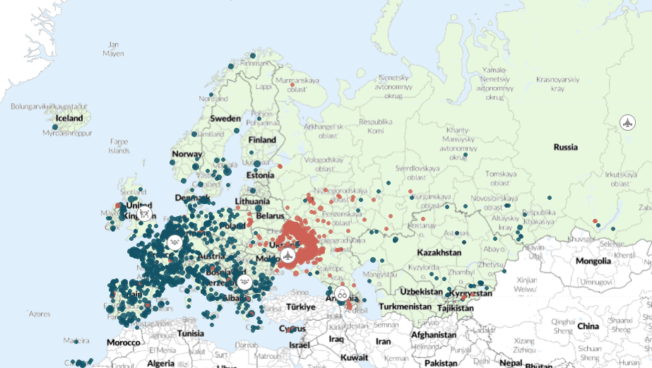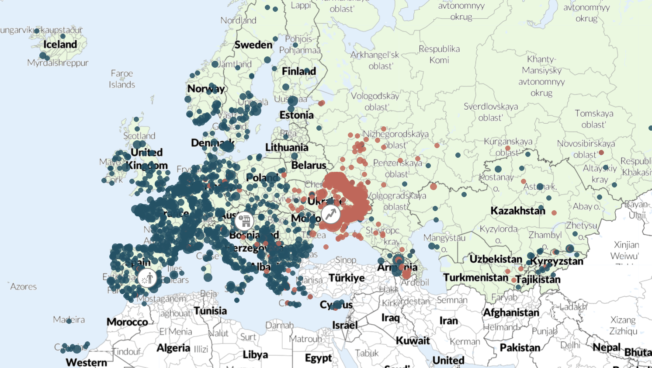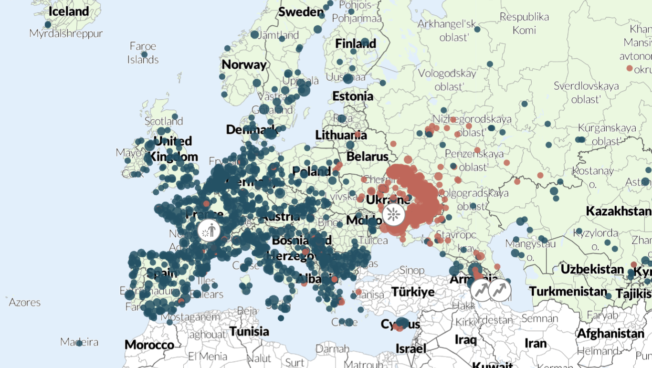Regional Overview
Europe and Central Asia
May 2024
Posted: 10 June 2024
In this Regional Overview
- Armenia: Border delimitation goes ahead despite protests
- Europe: A wave of student protests in support of Palestine
- Georgia: Ruling party pushes through foreign influence law
- Kyrgyzstan: Violence against foreign students and workers prompts exodus of Pakistani nationals
- Russia: Cross-border violence escalates
- Ukraine: Russia reopens the Kharkiv front
Armenia: Border delimitation goes ahead despite protests
On 24 May, Azerbaijan assumed control of four villages near the Armenian border,1Radio Free Europe/Radio Liberty, ‘Azerbaijan Regains Control Over 4 Villages Near Armenian Border,’ 24 May 2024 ending the border delimitation process that started in April. The handover of these territories precipitated increased tensions around the village of Kirants in the Tavush region. This area was partitioned as a result of the border delimitation process, with a section of the key road linking Armenia to Georgia ending up on the Azerbaijani side. Locals from border villages in the Tavush region rallied throughout the month, including on the Armenia-Georgia road. The demonstrators were opposed to the border demarcation and demanded compensation and infrastructure solutions that ensure their free movement within Armenian territory. The demonstrations, which started as Armenian and Azerbaijani authorities met for the first rounds of talks in late April, have seen occasional clashes with police. Protesters led by Archbishop Bagrat Galstanyan, primate of Tavush, marched for several days to Yerevan, demanding a stop to the border demarcation and Prime Minister Nikol Pashinyan’s resignation.
Like Pashinyan during the protests in 2018 that propelled him into office, Galstanyan is leading a large protest movement built on strong anti-government sentiment amid repeated failures to secure a favorable peace deal that would preserve Armenia’s borders and the rights of displaced Armenians.2RFE/RL, ‘Armenian PM Defends Demarcation Deal With Azerbaijan In Visit To Border Region,’ 25 May 2024 After courting opposition forces for weeks, on 26 May, Galstanyan announced his bid for prime minister.3RFE/RL, ‘Protest-Leading Armenian Archbishop Says He Will Challenge Pashinian For Premiership,’ 26 May, 2024 Large demonstrations were held on 6 May, 26 May, and 27 May in Yerevan, resulting in mass arrests, while limited scuffles between locals and law enforcement occurred in Tavush. Amid the demonstrations, Pashinyan has maintained his commitment to the delimitation process, with the focus now being shifted to solving infrastructure and compensation issues in the border region.
The month was also marked by the withdrawal of around 2,000 Russian border guards from Armenia’s eastern border, including Zvartnots International Airport, following negotiations between Pashinyan and Russian President Vladimir Putin.4Reuters, ‘Putin agrees to withdraw Russian forces from various Armenian regions, says Ifax,’ 9 May 2024; Dana Omirgazy, ‘Azerbaijan, Armenia Hold Peace Talks in Almaty,’ The Astana Times, 10 May 2024 Additionally, peace treaty negotiations continued in Almaty for the first time with yet unclear results.5Serikbol Koshmangabetov, ‘In Almaty, Foreign Ministers of Azerbaijan and Armenia Agreed to Continue Negotiations,’ Kazinform, 11 May 2024
Europe: A wave of student protests in support of Palestine
The number of demonstrations across Europe in support of Palestine and against the Israeli offensive in the Gaza Strip doubled compared with April. The increase in demonstrations coincided with Israel’s move into Rafah, the participation of an Israeli contestant in the Eurovision Song Contest, and the commemoration of Nakba Day on 15 May. Most demonstrations occurred in France, Spain, Italy, Germany, the Netherlands, and the United Kingdom. They remained overwhelmingly peaceful. Unlike in the previous months, May saw over 300 student-led demonstrations. Taking cue from the campus protests in the US, demonstrators created encampments and blocked access to school premises, demanding that academic, economic, and military ties with Israel be severed. Police dispersed at least 10 campus occupations in France, including twice at the Sorbonne in Paris. Police also evicted at least seven student camps in the Netherlands, including at the University of Amsterdam, where 125 people were detained after clashes with counter-demonstrators on 6 May, triggering further riots on the following day. Scuffles between pro-Palestine and pro-Israel demonstrators also occurred in Hamburg and Amsterdam, while demonstrators clashed with police in Berlin and Athens. Demonstrators at the Free University of Brussels (ULB) assaulted a group of Jewish students as they walked on campus carrying Israeli flags.6BX1, ‘Agressions d’étudiants juifs par les occupants pro-palestiniens sur le campus de l’ULB,’ 8 May 2024
Georgia: Ruling party pushes through foreign influence law
On 14 May, the ruling Georgian Dream party succeeded in passing a foreign influence bill through Parliament on its third reading. This bill passed despite mass protests that have shown no signs of abating since starting in April. President Salomé Zourabichvili refused to sign the bill into law and advised that the opposition unite ahead of general elections in October. Earlier, the Venice Commission of the Council of Europe strongly advised that Georgian authorities rescind the law.7Venice Commission of the Council of Europe, ‘Georgia – Urgent Opinion on the Law of Georgia on Transparency of Foreign Influence,’ 21 May 2024 While Georgia’s Prime Minister, Irakli Kobakhidze, defied external pressure and talked up Western-sponsored coup attempts,8Civil.ge, ‘PM Kobakhidze Accuses U.S. of Attempting Revolutions, Says Special Efforts Needed to “Restart” Relations,’ 3 May 2024 the United States announced it would restrict visa policy for those responsible for passing the law and their next of kin and initiate a review of bilateral cooperation.9US Department of State, ‘Announcement of a Visa Restriction Policy for Undermining Democracy in Georgia and Comprehensive Review of All U.S.-Georgia Cooperation,’ 23 May 2024 The European Union is mulling canceling the visa-free regime for all Georgian citizens and putting accession negotiations on hold.10Laura Dubois, Daria Mosolova, and Anastasia Stognei, ‘EU countries push for sanctions on Georgia over ‘Russian law,’ Financial Times, 22 May 2024 Parliament lifted the presidential veto on 28 May. Civil society organizations affected by the law vowed not to comply with it and are challenging it at the country’s Constitutional Court and the European Court of Human Rights.11Jam News, ‘Georgian NGOs to file constitutional lawsuit against “foreign agents” law,’ 30- May 2024
Demonstrations have remained at high levels since the bill reentered Parliament in March, with police regularly intervening to suppress demonstration activity. In the run-up to the vote, police dispersed demonstrators attempting to block access to the Parliament building. At the same time, there have been several notable acts of violence targeting opponents of the bill. Ahead of the vote, unidentified perpetrators beat up opposition figures and journalists in Tbilisi and two other cities. Meanwhile, the youth wing of the ruling Georgian Dream party assaulted protesting students at Tbilisi State University, with police standing by.
Kyrgyzstan: Violence against foreign students and workers prompts exodus of Pakistani nationals
On 13 May, a group of Kyrgyz youth picked a street fight with Pakistani nationals and chased them to their dormitory, where other foreigners pushed them back. A recording of the fight shared on social media prompted the formation of mobs of Kyrgyz men in the streets of Bishkek that attacked South Asian foreign workers and students, as well as Afghan refugees on 17 and 18 May. The violence prompted an exodus of foreigners from Kyrgyzstan. Hundreds of students from Pakistan left Kyrgyzstan’s capital Bishkek after the mob attacks on students and migrant workers, resulting in dozens of foreign nationals sustaining injuries.12Farangis Najibullah. et al., ‘Pakistani Student Exodus Damages Kyrgyzstan’s Reputation, Causes Economic Fallout,’ RFE/RL, 21 May 2024 The government of Pakistan indicated that about 4,000 of its citizens were expected to return after Pakistan’s authorities arranged “special flights” to bring back nationals of Pakistan from the Kyrgyz Republic.13Iftikhar Hussain, ‘Thousands of Pakistani students flee Kyrgyzstan amid attacks on universities, hostels’, Voice of America, 23 May 2024 According to the Kyrgyz interior ministry, six Kyrgyz and four foreign citizens had been detained on suspicion of being involved in the brawl that sparked the mob attacks in Bishkek.14RFE/RL’s Kyrgyz Service, ‘6 Kyrgyz, 4 Foreign Nationals Detained Over Mob Attacks In Bishkek’, RFE/RL, 22 May 2024
Russia: Cross-border violence escalates
Drone strikes and shelling killed over 40 civilians in Russia’s border regions — more than at any point since Russia’s invasion of Ukraine led to a spillover of violence on its own internationally recognized territory. Most of the fatalities occurred in the Belgorod region and especially in the eponymous regional capital. On 12 May, a section of a 10-story residential building collapsed in the city, reportedly killing 17 civilians and wounding 27 others. Russian authorities claimed the debris from an intercepted Ukrainian missile hit the building. Open-source analysts posited that Russia’s own missile or aerial bomb could have strayed or malfunctioned, as the impact wall was assessed as facing northeast.15Conflict Intelligence Team, ‘Sitrep for May 10-13, 2024 (as of 8 a.m. UTC+3),’ 13 May 2024 On 6 May, Ukrainian drones hit two trucks and two cars carrying agricultural workers near a border village of Berezovka, killing eight civilians and wounding 42 others. Cross-border shelling and drone strikes quadrupled in the Kursk region compared to the average in the previous three months.
Ukrainian drones also continued targeting oil and petrol facilities across Russia, reaching the far-flung Bashkortostan for the first time and focusing on the southern Krasnodar region in particular. The largest drone barrage to date occurred on 17 May overnight, mostly targeting power stations, oil storage, and port facilities in Novorossiysk. Blackouts occurred in the city, which is the major gateway for Russia’s maritime trade, especially in oil. In addition, on 23 and 27 May, Ukrainian drones hit early warning stations in the Krasnodar and Orenburg regions as Russia was conducting its tactical nuclear weapon drills.
Ukraine: Russia reopens the Kharkiv front
On 10 May, Russian forces launched a two-pronged cross-border offensive in the direction of Kharkiv city. Russia occupied over a dozen villages in the Kharkiv region and turned the Ukrainian border town of Vovchansk into a war zone. Reminiscent of the early stages of Russia’s all-out invasion in February and March 2022, reports trickled in detailing Russian forces abducting, torturing, and killing civilians caught up in fighting and trying to evacuate. Russia’s relentless bombardment of Kharkiv city and its environs with aerial bombs and artillery killed at least 40 civilians throughout the month, including 25 in strikes on a printing house on 23 May and a construction hypermarket on 25 May. After Ukrainian forces regained most of the Kharkiv region in September 2022, fighting previously concentrated in the area of Kupiansk at the junction with the Luhansk region. Russia’s operational goal could be to spread understaffed Ukrainian forces along a longer frontline to support its offensive in the Donetsk region, where the pace of the Russian forces’ advance slowed down with fighting on the eastern outskirts of Chasiv Yar stalling. They advanced in the direction of Ocheretyne northwest of Avdiivka, however, and captured an additional four settlements.
At the same time, Russia continued explicitly targeting Ukraine’s critical infrastructure. On 8 May, it sent one of the largest salvos of cruise missiles and drones at energy facilities in Western and Central Ukraine, damaging three unspecified power plants.16Riley Bailey et al., ‘Russian Offensive Campaign Assessment,’ Institute for the Study of War, 8 May 2024 This and previous attacks since March induced weekly rolling blackouts across Ukraine to limit power consumption and allow repairs.17David L. Stern, ‘With its energy network nearly destroyed, Ukraine already fears the winter,’ Washington Post, 18 May 2024
For more information, see the ACLED Ukraine Conflict Monitor
See More
See the Codebook and the User Guide for an overview of ACLED’s core methodology. For additional documentation, check the Knowledge Base. Region-specific methodology briefs can be accessed below.
Links:
For additional resources and in-depth updates on the conflict in Ukraine, check our dedicated Ukraine Confict Monitor.







